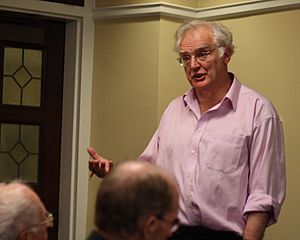John Pickstone facts for kids
John Victor Pickstone (born May 29, 1944 – died February 12, 2014) was a British historian. He was a special professor at the University of Manchester. He studied the history of science, technology, and medicine.
Contents
Growing Up and Education
John Pickstone grew up in Burnley, England. His family was Methodist. He went to Burnley Grammar School.
Later, he studied natural sciences, especially how living things work (physiology), at Fitzwilliam College, Cambridge. He also studied at Queen's University, Kingston in Canada.
He earned a master's degree in the history and philosophy of science in 1969. He then completed his PhD in 1974. His PhD research was about how living cells absorb water in the early 1800s.
His Work in Manchester
In 1974, John Pickstone moved to Manchester. He started working at UMIST. There, he studied the history of hospitals in the Manchester area.
In 1985, he helped create the Centre for the History of Science and Technology (CHSTM) at the Victoria University of Manchester. This center included a special unit for the history of medicine. It also had an archive for the history of computers. He led this center until 2002. After that, he became a Research Professor.
Studying Medical History
Later in his career, Pickstone focused on modern medical history. He studied topics like the history of cancer and how medical technology developed. He also looked at the history of science and technology in different regions.
He edited books and journal issues. One important book he edited was about the history of modern Earth and Life Sciences. His ideas about "Ways of Knowing" were very popular. He was invited to speak at universities around the world, including Yale and in Paris.
John Pickstone also helped start a series of lectures at the University of Manchester. He planned a big local history festival for the city.
What He Researched
John Pickstone was very interested in how medicine has changed recently. Some of his research projects included:
- The history of cancer in Britain.
- The development of medical technology.
- The history of mental health services.
- Changes in the National Health Service (NHS).
He believed that understanding history could help improve health policies today.
Big Ideas and Ways of Knowing
Pickstone also worked on "Big Pictures" and "Ways of Knowing." He thought that by looking at many different studies in the history of science, technology, and medicine, we could better understand long-term historical changes.
He explored these ideas in different areas, such as:
- How medical technologies developed.
- The connection between science and art.
- The relationship between science and technology.
- How the history of science, technology, and medicine is shown in museums.
 | Toni Morrison |
 | Barack Obama |
 | Martin Luther King Jr. |
 | Ralph Bunche |


